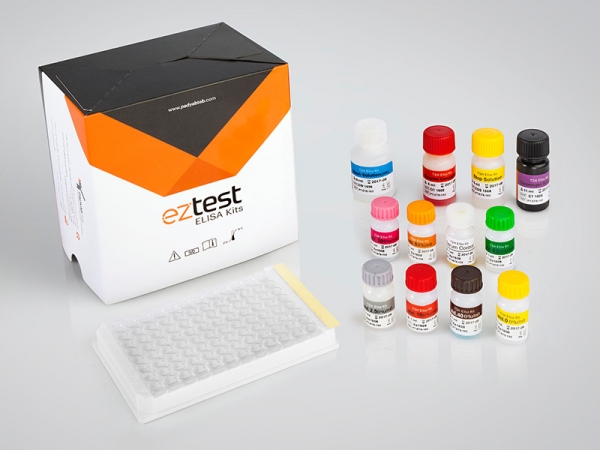| Name | PSA ELISA kit |
| Full name | Human PSA ELISA Test kit |
| Category Name | Cancer ELISA kits |
| Test | 96 |
| Method | ELISA method: Enzyme Linked Immunosorbent Assay |
| Principle | ELISA priciple- Peroxidase conjugated |
| Detection Range | 0-40 ng/mL |
| Sample | 20 µl serum |
| Sensitivity | 0.15 ng/mL |
| Total Time | ~60 min |
| Shelf Life | 12 Months from the manufacturing date |
PSA ELISA kit description:
PSA ELISA test kit is an Enzyme Immunoassay which provides a quantitative measurement of PSA in human serum.
Materials provided with PSA ELISA Test Kit:
1. Anti-PSA Antibody-coated ELISA Microplate (96 wells)
2. enzyme conjugate reagent: 1 Vials contains anti-PSA-HRP with preservative buffer, ready to use.(1 Vials, 12 ml)
3. PSA test reference standard set, contains 0, 1, 5, 10, 20, & 40 ng/ml(human liver standard 668/96 WHO) ready for use. (6 vials. 0.5 ml)
4. TMB Substrate: Hydrogen peroxide and tetra-methyl benzidine in preservative buffer, ready to use. (1 vial of 11ml)
5. Stop Solution: a normal hydrochloric acid (1 vial, 6 ml).
6. Concentrated washing buffer: PBS-Tween (1 vial 30ml) (20X)
7. Control serum: PSA in serum with preservatives(1Vial, 0.5 ml)
Materials Required,but not Provided:
1. Precision pipettes(20,50,100, µl)
2. Distilled or deionized water
3. EIA kit Microplate Washer
4. EIA kit Microplate Reader with a 450 nm, If possible, 630 nm as reference.
5. Absorbent paper
Introduction
Prostate-specific antigen (PSA) is a 34-kDa glycoprotein with serine protease activity. PSA is a prostate tissue-specific antigen in terms of immunological view and is secreted by normal cells, benign and cancerous cells of prostate epithelial. PSA is separated from prostatic acid phosphatase due to immunochemical functions. PSA concentrations increase in serum of patients with prostate cancer, benign prostatic hypertrophy and inflammatory conditions associated with surgery and metastasis. Currently, PSA is known as a valuable serum marker with a high accuracy in diagnosis and treatment monitoring of prostate cancer by surgery or other known therapies.
Principle of the assay
This assay is based on specific monoclonal antibody by the use of sandwich method. Anti-PSA monoclonal antibody is used to conjugation with enzyme for coating between the solid phase and an Anti-PSA antibody. By addition of the sample serum, the PSA molecule reacts with mentioned antibodies and sandwiches between bounded antibody on the solid phase and conjugated antibody. After an incubation period (45 minutes at room temperature), the sample is then decanted and the wells are washed to remove unbound-labeled antibody. An enzyme substrate-chromogen is added to the well and incubated for 15 minutes at room temperature, resulting in the development of a blue color. The addition of stop solution will stop the reaction and converts the color to yellow. The intensity is measured at 450 nm. The intensity of the yellow color is directly proportional to the concentration of PSA in the sample.



